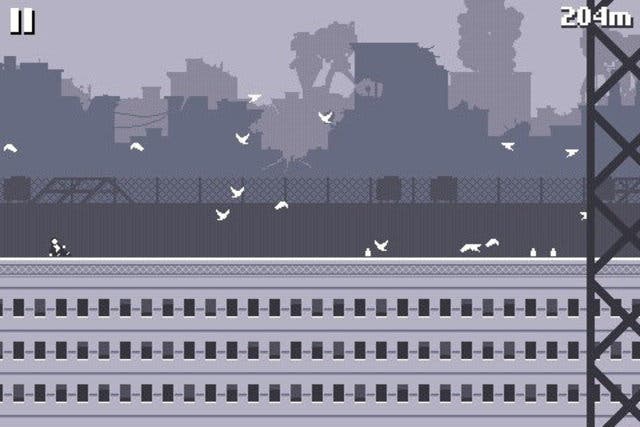Saturday Soapbox: Faster, Pussycat?
In praise of not waiting for things.
The joys of Ludum Dare - just as the joys of The Experimental Gameplay Project, or dozens of other such communities and competitions - comes with rooting through the end-results yourself and finding the hidden treasure. What I would say, though, as a little direction, is that Ludlum Dare's recent theme "It's dangerous to go alone! Take this!" had some particularly excellent entries, and any time you find something by Canabalt's tireless creator Adam "Atomic" Saltsman, or Steven Burgess, the LostWinds designer who's recently gone indie, or Droqen, a Canadian who turns out games that I love to play but don't like to think about while I'm eating, you're in for something special.
In truth, though, plenty of these games are special. They're built around a handful of striking mechanics, with art that often prioritises basic readability over anything else - which, ironically, almost always leads to an uncommonly strong graphical approach - and they don't outstay their welcome with too many unwanted levels or half-finished side modes. Playing them can even make an idiot like me appreciate the mysteries of design a little more, as they're not just games, but weird playable indicators of what's important in a game: guides to which feature is worth spending time iterating on, which elements will benefit the most from a little audio or a little colour, which mechanic needs explanatory text and which can be left to speak for itself.
It's a bit like being a burglar, I imagine. If you know you have all weekend to clear out somebody's mansion, you're going to end up taking all kinds of useless crap with you. If you only have an hour to bust into a penthouse, though, before the guards wake up, the gatling-gun robots come back online, and Mr and Mrs Whoever return from a fabulous night at the ENO, you're going to go straight for the jewels. Your approach will be pre-programmed to focus only on the really glittery prizes.

This gamejam stuff, this burgeoning rapid-prototyping movement, is starting to work its way into some surprising places in the wider design community, too. The Experimental Gameplay Project has contributors responsible for both World of Goo and Henry Hatsworth, while Jason Kapalka of Popcap, a company that in its own breezy way can compete with the likes of Valve and Blizzard when it comes to, you know, just hanging onto things, has admitted that Bejeweled Twist had an extra year of development in which nothing of too much value was added to it.
Elsewhere, Double Fine recently saved itself from doom in the boxed retail market by hacking out game concepts over intensive two week sessions known as Amnesiac Fortnights and then turning them into download titles, and at this week's Develop Conference, I learnt that Crytek UK put rapid prototyping at the centre of its work on Crysis 2's multiplayer content. Its designers churned out more than 65 different white box levels, each taking around 8 hours to construct, and then iterated from there. It suggests a really promising path for accelerated development, bringing tart moments of focused creativity to even the really large-scale productions, when and where they're needed the most.

If more time can give games polish, then, less time can leave them with a weird kind of clarity. Duke Nukem Forever, after all, took over a decade to complete, and what you got from that was a shooter that had been asphiated - and not in a sexy way, Duke - by design excess.
Most importantly, rapid prototypes and gamejams are great for players as well as designers. Ultimately, I don't really care if I'm getting my money's worth if a game's been lost amidst feature creep. I just want something dazzling to stir my calcified brain, and something truly unexpected to talk about afterwards.
